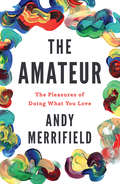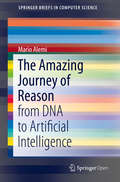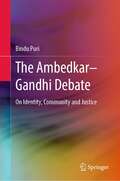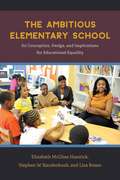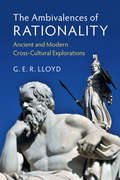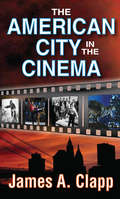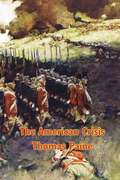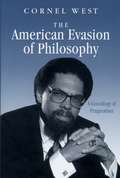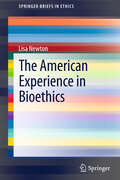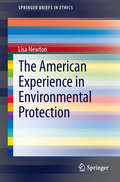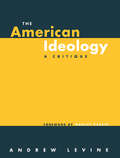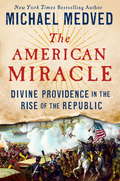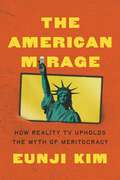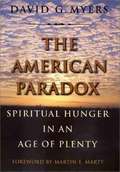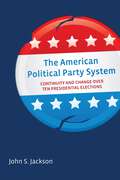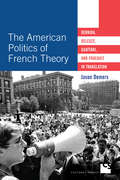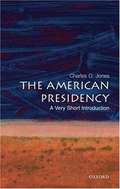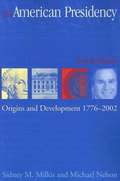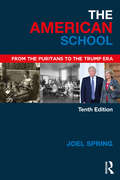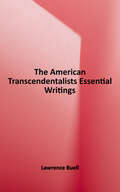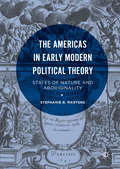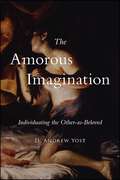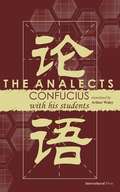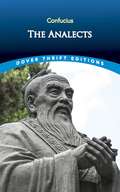- Table View
- List View
The Amateur: The Pleasures of Doing What You Love
by Andy MerrifieldA passionate attack on the tyranny of expertsModern life is being destroyed by experts and professionals. We have lost our amateur spirit and need to rediscover the radical and liberating pleasure of doing things we love.In The Amateur, thinker Andy Merrifield shows us how the many spheres of our lives—work, knowledge, cities, politics—have fallen into the hands of box tickers, bean counters and rule followers. In response, he corrals a team of independent thinkers, wayward poets, dabblers and square pegs who challenge the accepted wisdom. Such figures as Charles Baudelaire, Dostoevsky, Edward Said, Guy Debord, Hannah Arendt and Jane Jacobs show us the way. As we will see the amateur takes risks, thinks the unthinkable and seeks independence—and changes the world.The Amateur is a passionate manifesto for the liberated life, one that questions authority and reclaims the non–team player as a radical hero of our times.
The Amazing Journey of Reason: from DNA to Artificial Intelligence (SpringerBriefs in Computer Science)
by Mario AlemiThis Open Access book explores questions such as why and how did the first biological cells appear? And then complex organisms, brains, societies and –now– connected human societies? Physicists have good models for describing the evolution of the universe since the Big Bang, but can we apply the same concepts to the evolution of aggregated matter –living matter included? The Amazing Journey analyzes the latest results in chemistry, biology, neuroscience, anthropology and sociology under the light of the evolution of intelligence, seen as the ability of processing information. The main strength of this book is using just two concepts used in physics –information and energy– to explain: The emergence and evolution of life: procaryotes, eukaryotes and complex organismsThe emergence and evolution of the brainThe emergence and evolution of societies (human and not)Possible evolution of our "internet society" and the role that Artificial Intelligence is playing
The Ambedkar–Gandhi Debate: On Identity, Community and Justice
by Bindu PuriThis book reconstructs the philosophical issues informing the debate between the makers of modern India: Ambedkar and Gandhi. At one level, this debate was about a set of different but interconnected issues: caste and social hierarchies, untouchability, Hinduism, conversion, temple entry, and political separatism. The introduction to this book provides a brief overview of the engagements and conflicts in Gandhi and Ambedkar's central arguments. However, at another level, this book argues that the debate can be philosophically re-interpreted as raising their differences on the following issues: The nature of the self,The relationship between the individual self and the community,The appropriate relationship between the constitutive encumbrances of the self and a conception of justice,The relationship between memory, tradition, and self-identity. Ambedkar and Gandhi’s contrary conceptions of the self, history,itihaas, community and justice unpack incommensurable world views. These can be properly articulated only as very different answers to questions about the relationship between the present and the past. This book raises these questions and also establishes the link between the Ambedkar--Gandhi debate in the early 20th century and its re-interpretation as it resonates in the imagination and writing of marginalized social groups in the present times.
The Ambitious Elementary School: Its Conception, Design, and Implications for Educational Equality
by Lisa Rosen Stephen W. Raudenbush Elizabeth McGhee HassrickThe challenge of overcoming educational inequality in the United States can sometimes appear overwhelming, and great controversy exists as to whether or not elementary schools are up to the task, whether they can ameliorate existing social inequalities and initiate opportunities for economic and civic flourishing for all children. This book shows what can happen when you rethink schools from the ground up with precisely these goals in mind, approaching educational inequality and its entrenched causes head on, student by student. Drawing on an in-depth study of real schools on the South Side of Chicago, Elizabeth McGhee Hassrick, Stephen W. Raudenbush, and Lisa Rosen argue that effectively meeting the challenge of educational inequality requires a complete reorganization of institutional structures as well as wholly new norms, values, and practices that are animated by a relentless commitment to student learning. They examine a model that pulls teachers out of their isolated classrooms and places them into collaborative environments where they can share their curricula, teaching methods, and assessments of student progress with a school-based network of peers, parents, and other professionals. Within this structure, teachers, school leaders, social workers, and parents collaborate to ensure that every child receives instruction tailored to his or her developing skills. Cooperating schools share new tools for assessment and instruction and become sites for the training of new teachers. Parents become respected partners, and expert practitioners work with researchers to evaluate their work and refine their models for educational organization and practice. The authors show not only what such a model looks like but the dramatic results it produces for student learning and achievement. The result is a fresh, deeply informed, and remarkably clear portrait of school reform that directly addresses the real problems of educational inequality.
The Ambivalences of Rationality: Ancient and Modern Cross-Cultural Explorations
by G.E.R. LloydIs rationality a well-defined human universal such that ideas and behaviour can everywhere be judged by a single set of criteria? Or are the rational and the irrational simply cultural constructs? This study provides an alternative to both options. The universalist thesis underestimates the variety found in sound human reasonings exemplified across time and space and often displays a marked Eurocentric bias. The extreme relativist faces the danger of concluding that we are all locked into mutually unintelligible universes. These problems are worse when certain concepts, often inherited from ancient Greek thought, especially binaries such as nature and culture, or the literal and the metaphorical, are not examined critically. Drawing on a variety of disciplines, from philosophy to cognitive science, this book explores what both ancient societies (Greece and China especially) and modern ones (as revealed by ethnography) can teach us concerning the heterogeneity of what can be called rational.
The American City in the Cinema
by James A. ClappThe American city and the American movie industry grew up together in the early decades of the twentieth century, making film an ideal medium through which to better understand urban life. Exploiting the increasing popularity of large metropolitan cities and urban lifestyle, movies chronicled the city and the stories it generated. In this volume, urbanist James A. Clapp explores the reciprocal relationship between the city and the cinema within the dimensions of time and space.A variety of themes and actualizations have been repeated throughout the history of the cinema, including the roles of immigrants, women, small towns, family farms, and suburbia; and urban childhoods, family values, violent crime, politics, and dystopic futures. Clapp examines the different ways in which the city has been characterized as well as how it has been portrayed as a character itself.Some of the films discussed include Metropolis, King Kong, West Side Story, It's a Wonderful Life, American Beauty, Rebel without a Cause, American Graffiti, Blade Runner, Gangs of New York, The Untouchables, LA Confidential, Sunrise, Crash, American History X, Breakfast at Tiffany's, The Deer Hunter, and many more. This work will be enjoyed by urban specialists, moviegoers, and those interested in American, cultural, and film studies.
The American Crisis
by Thomas PaineThomas Paine wrote the American Crisis in an effort to justify the American Revolution and to bolster the moral of the Continental Army. THESE are the times that try men's souls. The summer soldier and the sunshine patriot will, in this crisis, shrink from the service of their country; but he that stands it now, deserves the love and thanks of man and woman. Tyranny, like hell, is not easily conquered; yet we have this consolation with us, that the harder the conflict, the more glorious the triumph. What we obtain too cheap, we esteem too lightly: it is dearness only that gives every thing its value. Heaven knows how to put a proper price upon its goods; and it would be strange indeed if so celestial an article as freedom should not be highly rated. Britain, with an army to enforce her tyranny, has declared that she has a right (not only to tax) but "to bind us in all cases whatsoever," and if being bound in that manner, is not slavery, then is there not such a thing as slavery upon earth. Even the expression is impious; for so unlimited a power can belong only to God.
The American Evasion Of Philosophy: A Genealogy Of Pragmatism (The Wisconsin Project On American Writers)
by Cornel WestTaking Emerson as his starting point, Cornel West’s basic task in this ambitious enterprise is to chart the emergence, development, decline, and recent resurgence of American pragmatism. John Dewey is the central figure in West’s pantheon of pragmatists, but he treats as well such varied mid-century representatives of the tradition as Sidney Hook, C. Wright Mills, W. E. B. Du Bois, Reinhold Niebuhr, and Lionel Trilling. West’s "genealogy" is, ultimately, a very personal work, for it is imbued throughout with the author’s conviction that a thorough reexamination of American pragmatism may help inspire and instruct contemporary efforts to remake and reform American society and culture.
The American Experience in Bioethics
by Lisa NewtonThis volume tracks the development in the United States of the field of Bioethics, Ethics applied to the disciplines of medicine, nursing, and health care in general, including medical research and the complex economic and political problems surrounding the provision of medical and nursing care. It explains how the United States developed, case by case, the central rules and principles of ER ethics in the Health Care System. The discussion includes the controversies centering on birth, death, clinical research, experimental procedures (cloning, reproductive technology, organ transplants), and ends with a substantial suggestion on the provision of health care for all.
The American Experience in Environmental Protection
by Lisa NewtonThis book tracks the growth of environmental awareness and conservation in the United States through the major trends of the 20th century, and establishes a philosophical ground for protection of the environment. It records a major cultural shift in the thinking of this nation, and provides guidelines for its continuation.
The American Ideology: A Critique (Pathways Through the Twenty-First Century)
by Andrew LevineFirst published in 2004. Routledge is an imprint of Taylor & Francis, an informa company.
The American Miracle: Divine Providence in the Rise of the Republic
by Michael MedvedLUCKY . . .OR BLESSED?The history of the United States displays an uncanny pattern: At moments of crisis, when the odds against success seem overwhelming and disaster looks imminent, fate intervenes to provide deliverance and progress. Historians may categorize these incidents as happy accidents, callous crimes, or the product of brilliant leadership, but the most notable leaders of the past four hundred years have identified this good fortune as something else--a reflection of divine providence. In The American Miracle, bestselling author and radio host Michael Medved recounts some of the most significant events in America's rise to prosperity and power, from the writing of the Constitution to the Civil War. He reveals a record of improbabilities and amazements that demonstrate what the Founders always believed: that events unfolded according to a master plan, with destiny playing an unmistakable role in lifting the nation to greatness. Among the stirring, illogical episodes described here:* A band of desperate religious refugees find themselves blown hopelessly off course, only to be deposited at the one spot on a wild continent best suited for their survival* George Washington's beaten army, surrounded by a ruthless foe and on the verge of annihilation, manages an impossible escape due to a freakish change in the weather* A famous conqueror known for seizing territory, frustrated by a slave rebellion and a frozen harbor, impulsively hands Thomas Jefferson a tract of land that doubles the size of the United States* A weary soldier picks up three cigars left behind in an open field and notices the stogies have been wrapped in a handwritten description of the enemy's secret battle plans--a revelation that gives Lincoln the supernatural sign he's awaited in order to free the slavesWhen millions worry over the nation losing its way, Medved's sweeping narrative, bursting with dramatic events and lively portraits of unforgettable, occasionally little-known characters, affirms America as "fortune's favorite," shaped by a distinctive destiny from our beginnings to the present day.From the Hardcover edition.
The American Mirage: How Reality TV Upholds the Myth of Meritocracy (Princeton Studies in Political Behavior)
by Eunji KimHow the entertainment narrative of upward mobility distorts the harsh economic realities in AmericaIn an age of growing wealth disparities, politicians on both sides of the aisle are sounding the alarm about the fading American Dream. Yet despite all evidence to the contrary, many still view the United States as the land of opportunity. The American Mirage addresses this puzzle by exposing the stark reality of today&’s media landscape, revealing how popular entertainment media shapes politics and public opinion in an increasingly news-avoiding nation.Drawing on an eclectic array of original data, Eunji Kim demonstrates how, amid a dazzling array of media choices, many Americans simply are not consuming the news. Instead, millions flock to entertainment programs that showcase real-life success stories, such as American Idol, Shark Tank, and MasterChef. Kim examines how shows like these leave viewers confoundingly optimistic about the prospects of upward mobility, promoting a false narrative of rugged individualism and meritocracy that contradicts what is being reported in the news.By taking seriously what people casually watch every day, The American Mirage shows how rags-to-riches programs perpetuate the myth of the American Dream, glorifying the economic winners, fostering tolerance for income inequality, and dampening support for redistributive policies that could improve people&’s lives.
The American Paradox: Spiritual Hunger in an Age of Plenty
by David G. MyersWell-known social psychologist David G. Myers addresses why Americans can have so many social problems--reflecting a deep spiritual poverty--at a time when material wealth is at record levels. 32 illustrations.
The American Political Party System
by John S. JacksonFrom party polarization, elections, and internal party politics, to the evolution of the U.S. presidency, John S. Jackson's new book has something for everyone interested in American politics. Beginning with a discussion of the creation of the U.S. government to the formation of today's political powerhouses, Jackson provides a narrative sweep of American party history like none other.Unique to this book is a detailed breakdown of the evolution of political parties from 1832 to the current era. Jackson explains how the reform era came to be, as well as how it produced the polarized party era we have today. In doing so, he guides the reader to an appreciation of where U.S. party politics originated and the aspirations of those who helped create the current system.Jackson also examines the internal mechanisms and personalities of the Democratic and Republican parties. He compares multiple presidential elections, thus telling a broader story of the unfolding of today's party polarization and gridlock. He also explores the theoretical meaning of the changes observed in the parties from the responsible party model perspective.The themes of continuity and change are set in the context of group-think versus rational decisionmaking. Specific focus is given to political elites who are sophisticated about politics and who make strategic decisions, but are also bound by their humanity and occasionally fail to see the right deci-sion due to their own personal biases.This book will be particularly useful for those who want to explore polarization, the responsible parties model, the rational actor model, and anyone who wants to better understand elections, party politics, and the evolution of the presidency.
The American Politics of French Theory: Derrida, Deleuze, Guattari, and Foucault in Translation (Cultural Spaces)
by Jason DemersWorking from the premise that May ‘68 is a shorthand that delimits an intensive decade of global revolt, Jason Demers documents the cross-pollination of French philosophy, international activist movements, and American countercultures. From the assassinations of Martin Luther King, Jr. and George Jackson to the revolt at Columbia University, the 1968 Democratic National Convention, Woodstock, and the Weather Underground, Demers writes French theory into a constellation of American events and icons uncontained by national borders. More than a compelling new take on the history of theory, The American Politics of French Theory develops concepts gleaned from the work of Derrida, Deleuze, Guattari, and Foucault, providing new tools for thinking about translation, theory, and politics. By recontextualizing "French theory" within a complex fabric of mass communication and global revolt, Demers demonstrates why it is politically potent and methodologically necessary to think of translation associatively.
The American Presidency: A Very Short Introduction
by Charles O. JonesThe expansion of executive powers amid the war on terrorism has brought the presidency to the center of heated public debate. Now, in The American Presidency, presidential authority Charles O. Jones provides invaluable background to the current controversy, in a compact, reliable guide to the office of the chief executive. This marvelously concise survey is packed with information about the presidency, some of it quite surprising. We learn, for example, that the Founders adopted the word "president" over "governor" and other alternatives because it suggested a light hand, as in one who presides, rather than rules. Indeed, the Constitutional Convention first agreed to a weak chief executive elected by congress for one seven-year term, later calling for independent election and separation of powers. Jones sheds much light on how assertive leaders, such as Andrew Jackson, Theodore Roosevelt, and FDR enhanced the power of the presidency, and illuminating how such factors as philosophy (Reagan's anti-Communist conservatism), the legacy of previous presidencies (Jimmy Carter following Watergate), relations with Congress, and the impact of outside events have all influenced presidential authority. He also explores the rise of federal power and the dramatic expansion of federal agencies, showing how the president takes a direct hand in this vast bureaucracy, and he examines the political process of selecting presidents, from the days of deadlocked conventions to the rise of the primary after World War II. "In 200 years," he writes, "the presidency had changed from that of a person--Washington followed by Adams, then Jefferson--to a presidential enterprise with a cast of thousands." Jones explains how this remarkable expansion has occurred and where it may lead in the future.
The American Presidency: Origins and Development, 1776-2002 (Fourth Edition)
by Michael Nelson Sidney M. MilkisThis book intends to provide students with a solid under-girding for their study of the American presidency, the Constitution, political development, and contemporary U.S. politics and government.
The American Republic
by O. A. BrownsonFrom the author's preface: In the volume which, with much diffidence, is here offered to the public, I have given, as far as I have considered it worth giving, my whole thought in a connected form on the nature, necessity, extent, authority, origin, ground, and constitution of government, and the unity, nationality, constitution, tendencies, and destiny of the American Republic
The American School: From the Puritans to the Trump Era (Sociocultural, Political, and Historical Studies in Education)
by Joel SpringThis current, comprehensive history of American education is designed to stimulate critical analysis and critical thinking by offering alternative interpretations of each historical period. In his signature straight-forward, concise style, Joel Spring provides a variety of interpretations of American schooling, from conservative to leftist, in order to spark the reader’s own critical thinking about history and schools. This tenth edition follows the history of American education from the seventeenth century to the integration into global capitalism of the twenty-first century to the tumultuous current political landscape. In particular, the updates focus on tracing the direct religious links between the colonial Puritans and the current-day Trump administration. Chapters 1 and 2 have been rewritten to take a closer look at religious traditions in American schools, leading up to the educational ideas of the current U.S. Secretary of Education Betsy DeVos. An updated Chapter 15 further links traditional religious fundamentalist ideas and the twentieth century free market arguments of the Chicago school of economists to President Trump’s administration and the influence of the Alt-Right.
The American Transcendentalists: Essential Writings
by Lawrence BuellTranscendentalism was the first major intellectual movement in U.S. history, championing the inherent divinity of each individual, as well as the value of collective social action. In the mid-nineteenth century, the movement took off, changing how Americans thought about religion, literature, the natural world, class distinctions, the role of women, and the existence of slavery. Edited by the eminent scholar Lawrence Buell, this comprehensive anthology contains the essential writings of Ralph Waldo Emerson, Henry David Thoreau, Margaret Fuller, and their fellow visionaries. There are also reflections on the movement by Charles Dickens, Henry James, Walt Whitman, Louisa May Alcott, and Nathaniel Hawthorne. This remarkable volume introduces the radical innovations of a brilliant group of thinkers whose impact on religious thought, social reform, philosophy, and literature continues to reverberate in the twenty-first century.
The Americas in Early Modern Political Theory
by Stephanie B. MartensThis book examines early modern social contract theories within European representations of the Americas in the 16th and 17th century. Despite addressing the Americas only marginally, social contract theories transformed American social imaginaries prevalent at the time into Aboriginality, allowing for the emergence of the idea of civilization and the possibility for diverse discourses of Aboriginalism leading to excluding and discriminatory forms of subjectivity, citizenship, and politics. What appears then is a form of Aboriginalism pitting the American/Aboriginal other against the nascent idea of civilization. The legacy of this political construction of difference is essential to contemporary politics in settler societies. The author shows the intellectual processes behind this assignation and its role in modern political theory, still bearing consequences today. The way one conceives of citizenship and sovereignty underlies some of the difficulties settler societies have in accommodating Indigenous claims for recognition and self-government.
The Amorous Imagination: Individuating the Other-as-Beloved (SUNY series in Contemporary French Thought)
by D. Andrew YostIn The Amorous Imagination, D. Andrew Yost builds upon Jean-Luc Marion's phenomenology of love to argue that through the interpretive activities of the imagination the Beloved appears to the lover as this Other, not the Other. Weaving together insights from Romantic thought and contemporary French philosophy, Yost describes the distinctive role the imagination plays in individuating another person so that they appear radically unique, special, and unsubstitutable. This radical uniqueness—or haecceitas—emerges out of the lovers' engagement in an "endless hermeneutic," an ongoing process of creative and responsive meaning-making that grounds the lovers' lives in each other and opens them up to new possibilities. All of this, Yost argues, is made possible by the amorous imagination. Drawing from the deep well of love poetry, mythology, philosophy, and literature The Amorous Imagination comes to the provocative conclusion that without the productive power of the imagination love itself could not emerge.
The Analects
by Confucius Arthur WaleyTogether they express a philosophy, or a moral code, by which Confucius, one of the most humane thinkers of all time, believed everyone should live. Upholding the ideals of wisdom, self-knowledge, courage and love of one's fellow man, he argued that the pursuit of virtue should be every individual's supreme goal.
The Analects (Dover Thrift Editions Ser.)
by ConfuciusIn this excellent English translation of The Analects, or Sayings, of Confucius, readers will find a rich distillation of the timeless precepts of one of history's most influential teachers and social theorists. A Chinese philosopher who lived c. 551 to c. 479 B.C., Confucius originated and taught an ethical, socially oriented philosophy that stressed proper behavior and a sympathetic, mutually supportive attitude among individuals, their families and society. From his teachings came a system of ethics for managing society that has influenced generations of politicians, social reformers, and religious thinkers. Indeed, the effect of Confucian philosophy has been so profound that it has become basic not only to an understanding of traditional Chinese civilization, but of Western society as well. Now the essence of Confucian teaching, contained in The Analects, is available in this inexpensive volume, providing inspirational and instructive reading to anyone interested in the history of social thought, Chinese philosophy, or theories of ethical behavior.
